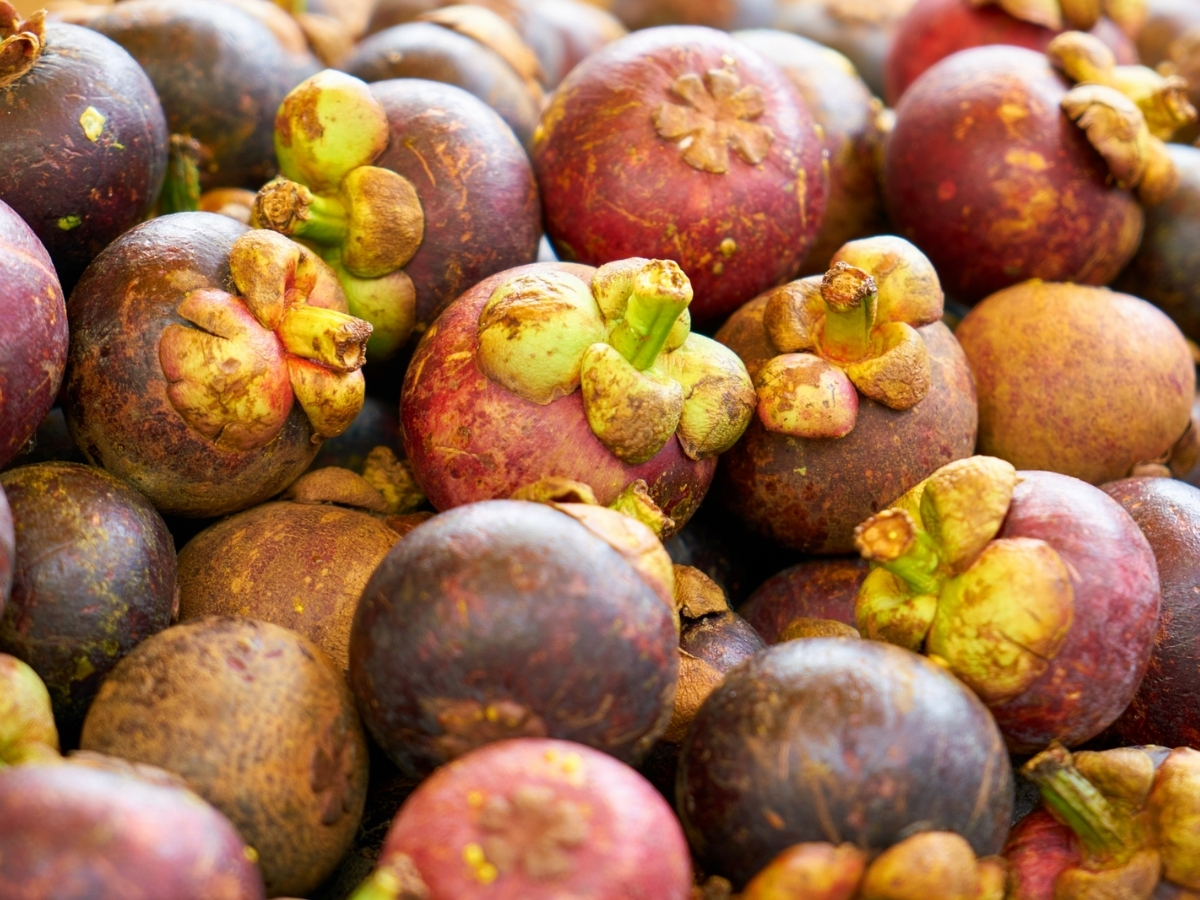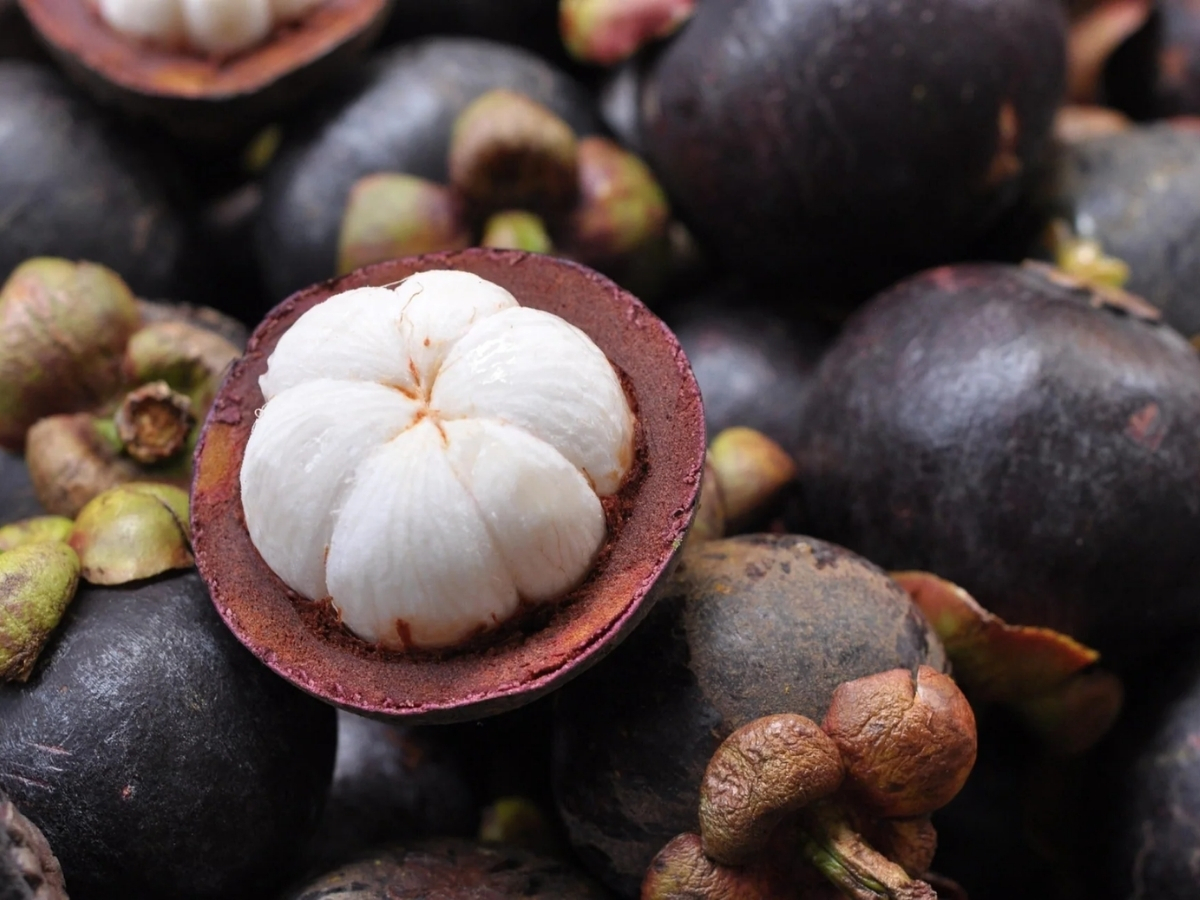Mangosteen is not only known for its naturally sweet and tangy flavor, but it may also offer certain health benefits, especially for people with diabetes. With its antioxidant-rich profile, fiber content, and low calorie count, this tropical fruit could be a smart addition to a diabetes-friendly diet. In this article, Natural Health takes a closer look at the question many are asking: is mangosteen good for diabetes? Let’s find out together.
What is mangosteen? Health benefit of mangosteen for diabetes
Mangosteen is a tropical fruit known for its sweet and tangy flavor, often referred to as the “queen of fruits.” It has a thick, deep purple rind and soft, white, juicy flesh divided into segments. Beyond its irresistible taste, mangosteen offers an impressive nutritional profile, rich in vitamin C, dietary fiber, and potent antioxidants known as xanthones.[1]

Highly nutritious
Beyond its refreshing taste, mangosteen is a powerhouse of nutrients. Let’s take a closer look at what makes this tropical fruit so beneficial:[2]
| Nutrient | Amount |
| Calories | 143 |
| Carbs | 35.1g |
| Fiber | 3.5g |
| Fat | 1g |
| Vitamin C | 5.68mg |
| Potassium | 94.1mg |
Mangosteen is a nutritious fruit containing 143 calories and rich in carbohydrates (35.1g), providing energy for the body, along with 3.5g of fiber that supports digestion and promotes a feeling of fullness. Its low fat content (1g) makes it an ideal choice for those following a weight-loss or low-fat diet.
With such a rich content of vitamins and minerals, mangosteen deserves to be one of the fruits regularly included in the daily diet to maintain optimal health.
Rich in powerful antioxidants
Mangosteen is well known for its powerful antioxidants. These substances help protect the body from damage caused by harmful molecules called free radicals.[3] Mangosteen contains vitamin C, manganese, and xanthones, a special group of plant compounds with strong antioxidant effects.[4] Research suggests that xanthones may help reduce inflammation and support anti-aging, anticancer, and antidiabetic benefits.[5]
In a 2015 study, 30 participants drank a mangosteen-based beverage daily for 30 days, while another group consumed a drink that did not contain mangosteen. After 30 days, those who consumed the mangosteen drink had 15% more antioxidants in their blood compared to those who drank the non-mangosteen beverage, suggesting a notable boost in antioxidant levels.[6]
Support weight loss process
Mangosteen is commonly known as a fruit that may support weight loss. In a small 8-week study, people who drank mangosteen juice twice a day had a lower body mass index (BMI) compared to those who didn’t.[7] Some experts believe that mangosteen’s anti-inflammatory properties may help the body burn fat and prevent weight gain.[8]
Supports blood sugar control
Mangosteen is also a good source of fiber, which supports blood sugar control by slowing digestion and reducing blood sugar spikes. Thanks to its unique combination of natural compound: xanthones, powerful antioxidants found in mangosteen, have been shown in lab and animal studies to help:[9]
- Improve insulin sensitivity
- Lower blood sugar levels
- Inhibit enzymes that break down carbohydrates
Read more: 17+ Best fruits good for diabetes & What to Avoid
Other overall health benefits
Mangosteen may offer several health benefits for the heart, brain, digestion, and blood sugar control:
- Heart health: Animal studies suggest that mangosteen extract can help lower unhealthy blood fats, like bad cholesterol and triglycerides, while raising levels of good cholesterol.[10] These effects may contribute to a lower risk of heart disease.[11]
- Alzheimer’s disease: Lab studies have shown that gamma-mangostin and other xanthones found in mangosteen can protect brain cells from beta-amyloid damage and help reduce its accumulation.[12] In animal studies, mangosteen peel extract also improved memory in mice.
- Digestive health: Mangosteen is a good source of fiber, one cup provides about 14% of the recommended daily intake.[2] Fiber supports healthy digestion and regular bowel movements.[13]
Is mangosteen good for diabetes?
Is mangosteen good for diabetes? Yes, mangosteen is good for diabetes. Several studies suggest that compounds in mangosteen, especially xanthones, may help regulate blood sugar levels and improve insulin sensitivity.
A 2018 study, found that obese women who took 400mg of mangosteen extract daily for 26 weeks experienced a significant reduction in insulin resistance.[15] Which is a key risk factor for type 2 diabetes. Additionally, mangosteen is a good source of fiber, which helps stabilize blood sugar levels by slowing digestion and preventing spikes after meals.

Read also: Is an apple good for diabetes? A dietitian answers A-Z
How to eat mangosteen for people with diabetics?
People with diabetes can safely enjoy mangosteen in moderation as part of a balanced diet. Here are some tips:
- Eat the fresh fruit, not juice or sweetened products: Fresh mangosteen is lower in sugar compared to mangosteen juice or processed products, which often contain added sugars that can spike blood glucose levels.
- Portion control: According to the USDA, 100g of fresh mangosteen contains about 17g of carbohydrates, mostly from natural sugars, so portion control is important.[2] Limit portion size: Stick to about 1/2 cup (about 4–5 segments) per serving. This keeps total carbohydrate intake in check, especially if you’re counting carbs for blood sugar management.
- Pair it with protein or fiber: To help slow the absorption of sugar into the bloodstream, it’s a good idea to eat mangosteen along with a source of protein or healthy fat, like a few nuts or plain yogurt.
- Avoid dried mangosteen or syrup-preserved versions: These forms are often high in sugar and not ideal for diabetics.[16]
“While mangosteen may offer benefits, it should be viewed as a supportive fruit, not a treatment. Always consult with a healthcare provider or nutritionist before making significant dietary changes.”
Frequently asked question
Is mangosteen high in sugar?
Mangosteen does contain natural sugar, but in moderate amounts compared to many other tropical fruits. One mangosteen (about 100 g) has around 13-16 g of sugar, similar to a small apple.[17] For people managing blood sugar, portion control is key.
Read more: Is banana good for diabetes? Expert Insights 2025
How many mangosteen can I eat in a day?
For People with Diabetes: Aim for 1–2 medium mangosteens per day (about ½ cup or 4–5 segments; ~12 g carbs) to manage blood sugar effectively. This controlled portion fits within the typical fruit-carb allowance for diabetics (15 g carbs per serving). Pairing with protein or healthy fats further stabilizes blood sugar.
For Individuals without Diabetes (General Health): Eating 1–3 mangosteens daily is considered safe and beneficial for most people and is a reasonable, balanced choice.
What is the best time to drink mangosteen tea?
There isn’t a specific best time to drink mangosteen tea, but it can be enjoyed in moderation as part of a healthy routine. Many people like it in the morning for a light, refreshing start, after meals to support digestion, or in the evening as a calming, caffeine-free drink. Choose the time that best fits your lifestyle and wellness goals.
Mangosteen it’s full of nutrients and antioxidants that may help support better health, especially for people with diabetes. If you’ve ever wondered, is mangosteen good for diabetes? At Natural Health, we highlight oranges as a wholesome fruit. When eaten in moderation, it can play a positive role in supporting diabetes management. Mangosteen can fit into a diabetes-friendly diet, but moderation is key.


Last medically reviewed on
How we reviewed this article:
Reference
[1] Mangosteens; Food and Chemical Toxicology, Sciencedirect; 2017
[2] Mangosteen, canned, syrup pack; U.S. Department of Agriculture Agricultural Research Service; 2019
[3] A Review on Free Radicals and Antioxidants; Hourieh Alkadi; 2020
[4] The purple mangosteen (Garcinia mangostana): Defining the anticancer potential of selected xanthones; Mirielle C Nauman, Jeremy J Johnson; 2022
[5] Medicinal properties of mangosteen (Garcinia mangostana L.): A comprehensive update; Berenice Ovalle-Magallanes, Dianelena Eugenio-Pérez, José Pedraza-Chaverri; 2017
[6] Daily consumption of a mangosteen-based drink improves in vivo antioxidant and anti-inflammatory biomarkers in healthy adults: a randomized, double-blind, placebo-controlled clinical trial; Zhuohong Xie, Marsha Sintara, Tony Chang, Boxin Ou; 2015
[7] Evaluation of Mangosteen juice blend on biomarkers of inflammation in obese subjects: a pilot, dose finding study; Jay K Udani, Betsy B Singh, Marilyn L Barrett, Vijay J Singh; 2009
[8] New insights into the anti-obesity activity of xanthones from Garcinia mangostana; Qian-Yu Liu, Yi-Tao Wang, Li-Gen Lin; 2015
[9] Mangosteen Extract Shows a Potent Insulin Sensitizing Effect in Obese Female Patients: A Prospective Randomized Controlled Pilot Study; Mikiko Watanabe, Elena Gangitano, Davide Francomano, Eliana Addessi, Raffaella Toscano, Daniela Costantini, Dario Tuccinardi, Stefania Mariani, Sabrina Basciani, Giovanni Spera, Lucio Gnessi, Carla Lubrano; 2018
[10] Vasa vasorum anti-angiogenesis through H₂O₂, HIF-1α, NF-κB, and iNOS inhibition by mangosteen pericarp ethanolic extract (Garcinia mangostana Linn) in hypercholesterol-diet-given Rattus norvegicus Wistar strain; Titin Andri Wihastuti, Djanggan Sargowo, Askandar Tjokroprawiro, Nur Permatasari, Mohammad Aris Widodo, Setyowati Soeharto; 2014
[11] The effects of mangosteen peel (Garcinia mangostana L.) and Turmeric (Curcuma domestica Val) flour dietary supplementation on the growth performance, lipid profile, and abdominal fat content in Cihateup ducks; Andri Kusmayadi, Kamiel Roesman Bachtiar, Caribu Hadi Prayitno; 2019
[12] The Therapeutic Potential of Mangosteen Pericarp as an Adjunctive Therapy for Bipolar Disorder and Schizophrenia; Melanie M. Ashton, Olivia M. Dean, Adam J. Walker, Chiara C. Bortolasci, Chee H. Ng, Malcolm Hopwood, Brian H. Harvey, Marisa Möller, John J. McGrath, Wolfgang Marx, Alyna Turner, Seetal Dodd, James G. Scott, Jon-Paul Khoo, Ken Walder, Jerome Sarris, Michael Berk; 2019
[13] Closing America’s Fiber Intake Gap; Diane Quagliani, Patricia Felt-Gunderson; 2016
[14] Review of Garcinia mangostana and its Xanthones in Metabolic Syndrome and Related Complications; Hourieh Tousian Shandiz, Bibi Marjan Razavi, Hossein Hosseinzadeh; 2017
[15] How Healthy Lifestyle Factors at Midlife Relate to Healthy Aging; Nathalie Atallah, Moufidath Adjibade, Hélène Lelong, Serge Hercberg, Pilar Galan, Karen E Assmann, Emmanuelle Kesse-Guyot; 2018
[16] Consumption of Dried Fruits Is Associated with Greater Intakes of Under Consumed Nutrients, Higher Total Energy Intakes, and Better Diet Quality in US Adults: A Cross-Sectional Analysis of the National Health and Nutrition Examination Survey, 2007-2016; Valerie K Sullivan, Muzi Na, David N Proctor, Penny M Kris-Etherton, Kristina S Petersen; 2021
Share this article
Read this next
Is water lemon good for diabetes? What should you know
Lemon water is good for diabetes, not just because it’s refreshing, but because it offers real support for blood sugar control. With zero added sugar, rich in vitamin C and antioxidants, it may help improve hydration, aid digestion, and reduce post-meal blood sugar spikes. At Natural Health, we break down how to make lemon water…
Apple cider vinegar for diabetes: The research says and tips to use
At Natural Health, we explore the growing interest in apple cider vinegar for diabetes. Studies suggest it may help improve insulin sensitivity and lower blood sugar levels after meals. This article explains how apple cider vinegar works, how to use it safely, and what people with diabetes need to know before adding it to their…
Is sweet corn good for diabetes? Dietitians explain
At Natural Health, we know many people managing blood sugar often ask, is sweet corn good for diabetes? The short answer: YES, with the right portion. Corn contains fiber, vitamins, and antioxidants that support overall health. In this guide, we break down how corn fits into a diabetes-friendly diet and how to enjoy it without…